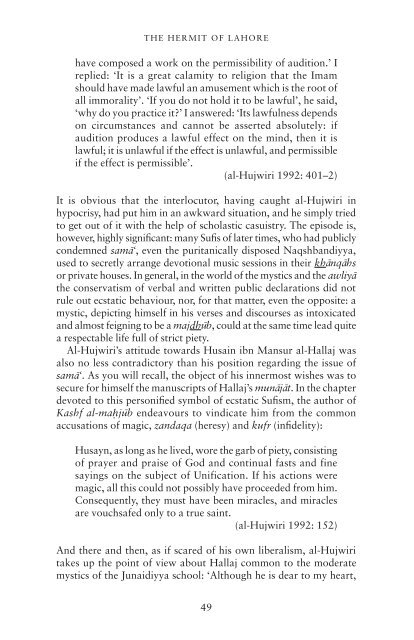Muslim Saints of South Asia: The eleventh to ... - blog blog blog
Muslim Saints of South Asia: The eleventh to ... - blog blog blog
Muslim Saints of South Asia: The eleventh to ... - blog blog blog
You also want an ePaper? Increase the reach of your titles
YUMPU automatically turns print PDFs into web optimized ePapers that Google loves.
THE HERMIT OF LAHORE<br />
have composed a work on the permissibility <strong>of</strong> audition.’ I<br />
replied: ‘It is a great calamity <strong>to</strong> religion that the Imam<br />
should have made lawful an amusement which is the root <strong>of</strong><br />
all immorality’. ‘If you do not hold it <strong>to</strong> be lawful’, he said,<br />
‘why do you practice it?’ I answered: ‘Its lawfulness depends<br />
on circumstances and cannot be asserted absolutely: if<br />
audition produces a lawful effect on the mind, then it is<br />
lawful; it is unlawful if the effect is unlawful, and permissible<br />
if the effect is permissible’.<br />
(al-Hujwiri 1992: 401–2)<br />
It is obvious that the interlocu<strong>to</strong>r, having caught al-Hujwiri in<br />
hypocrisy, had put him in an awkward situation, and he simply tried<br />
<strong>to</strong> get out <strong>of</strong> it with the help <strong>of</strong> scholastic casuistry. <strong>The</strong> episode is,<br />
however, highly significant: many Sufis <strong>of</strong> later times, who had publicly<br />
condemned samā‘, even the puritanically disposed Naqshbandiyya,<br />
used <strong>to</strong> secretly arrange devotional music sessions in their khānqāhs<br />
or private houses. In general, in the world <strong>of</strong> the mystics and the awliyā<br />
the conservatism <strong>of</strong> verbal and written public declarations did not<br />
rule out ecstatic behaviour, nor, for that matter, even the opposite: a<br />
mystic, depicting himself in his verses and discourses as in<strong>to</strong>xicated<br />
and almost feigning <strong>to</strong> be a majdhūb, could at the same time lead quite<br />
a respectable life full <strong>of</strong> strict piety.<br />
Al-Hujwiri’s attitude <strong>to</strong>wards Husain ibn Mansur al-Hallaj was<br />
also no less contradic<strong>to</strong>ry than his position regarding the issue <strong>of</strong><br />
samā‘. As you will recall, the object <strong>of</strong> his innermost wishes was <strong>to</strong><br />
secure for himself the manuscripts <strong>of</strong> Hallaj’s munājāt. In the chapter<br />
devoted <strong>to</strong> this personified symbol <strong>of</strong> ecstatic Sufism, the author <strong>of</strong><br />
Kashf al-mah˛jūb endeavours <strong>to</strong> vindicate him from the common<br />
accusations <strong>of</strong> magic, zandaqa (heresy) and kufr (infidelity):<br />
Husayn, as long as he lived, wore the garb <strong>of</strong> piety, consisting<br />
<strong>of</strong> prayer and praise <strong>of</strong> God and continual fasts and fine<br />
sayings on the subject <strong>of</strong> Unification. If his actions were<br />
magic, all this could not possibly have proceeded from him.<br />
Consequently, they must have been miracles, and miracles<br />
are vouchsafed only <strong>to</strong> a true saint.<br />
(al-Hujwiri 1992: 152)<br />
And there and then, as if scared <strong>of</strong> his own liberalism, al-Hujwiri<br />
takes up the point <strong>of</strong> view about Hallaj common <strong>to</strong> the moderate<br />
mystics <strong>of</strong> the Junaidiyya school: ‘Although he is dear <strong>to</strong> my heart,<br />
49


